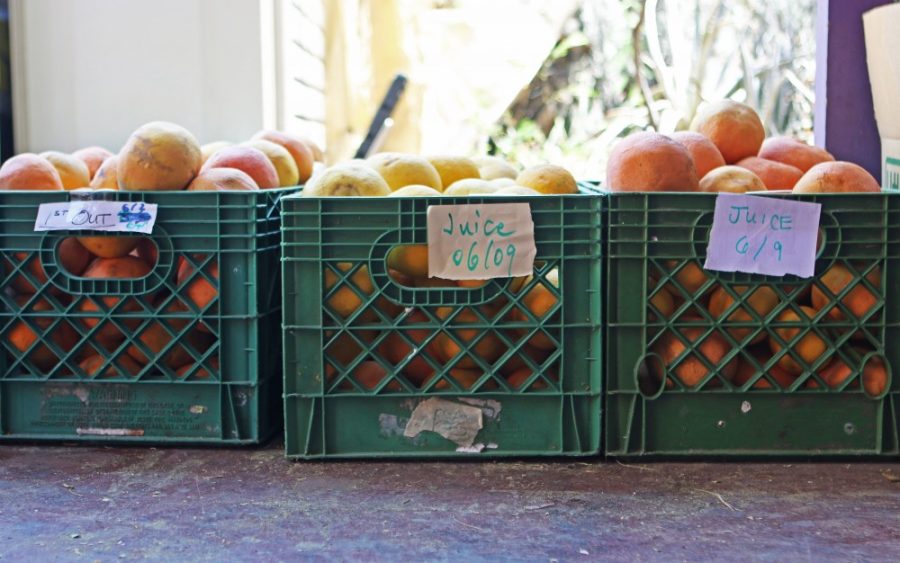“We who are able must support the people, because we do not have money to give, but we have energy to give,” Elijah Mliwa said as he picked another fruit from the Peruvian apple cactus and dropped it in the box behind him.
Mliwa is a volunteer with the Iskashitaa Refugee Network, an organization in Tucson that works to harvest produce while empowering refugees. According to the United States Department of Agriculture, between 30 and 40 percent of the nation’s food supply is wasted each year.
Iskashitaa harvests locally grown fruits and vegetables that would otherwise be wasted and gives the produce to members of the community in need. They also bring together refugees from Africa, Asia and the Middle East and help integrate them into the community.
Dr. Barbara Eisworth started Iskashitaa in 2003 when she gathered a group of refugee students in Tucson to locate areas in the city where produce was going to waste. Since then, the organization has expanded to re-distributing produce, sustainable food education, multiple harvesting techniques and education regarding identifying edible plants.
RELATED: Iskashitaa Refugee Network collects, distributes food, helps refugees find community
The name Iskashitaa came from Eisworth’s work with Somali Banti youth. According to Iskashitaa’s website, the word Iskashitaa had no written form when Eisworth learned it. Developing a network focused on empowerment and education, Eisworth felt that no other word would fit better for her network, so she created her own spelling of Iskashitaa.
Iskashitaa has two harvests per week on Wednesday and Friday mornings. The produce being harvested and the locations vary each week. Many of the locations are backyard farms, neighborhoods and other plants in the city that are either not being harvested or producing too much produce for the owners to use. In addition to harvesting, the network works to educate the community on how to reduce waste in their own lives.
Food preservation workshops are aimed toward teaching refugees about how to use the food they harvest and preparing them for work in food industries. Refugees not only have the opportunity to learn from these workshops, but they also are able to lead them.
The network is led by a group of volunteers who plan and lead the events and organize the re-distribution of the produce. One of the head volunteers, Jack Speelman, not only works with the harvests but finds himself involved in all aspects of Iskashitaa.
“I volunteer with harvests; I volunteer with office work, anything that needs to be done,” he said. “I’m kind of the jack of all trades, pardon the pun.”
Speelman recently graduated from the University of Arizona with his degree in mechanical engineering and has been working with Iskashitaa ever since.
“About a year ago, I didn’t have a job and I didn’t have school over the summer and I was looking for something to do, so I started volunteering at various places and really got sucked into the community and the work itself that we were doing here at Iskashitaa,” Speelman said. “With everything going on in the news and all the stress in my life I can come here and I can help other people and I can see directly what impact I’m making. That’s just really good to see, and it’s a really good contrast with the rest of life.”
Volunteers from the Tucson community and UA students work with the refugees to create a diverse inter-generational group working to better themselves and the community. Tom Kopstein, a sophomore at the UA, learned about the network through one of his classes at school and decided to get involved with the harvests at Iskashitaa.
“I liked picking the fruit. I thought it was interesting that we have all of these edible foods just kind of around Tucson that are just kind of waiting to be picked,” he said. “I liked interacting with the refugee community as well. You can learn a lot from different people from different places in the world.”
RELATED: UA community garden paints cistern
Throughout the harvests, the head volunteers explain the fruits and vegetables that need to be picked and even let the volunteers taste them while they harvest. At the end of the harvest all of the produce is weighed and sorted and each volunteer gets to take a portion home.
“I think my favorite part of today was definitely taking the fruit off the cactus,” Kopstein said. “It tasted like kiwi. I’m going to take some home.”
The spirit of community at Iskashitaa is contagious, and the enthusiasm and eagerness to help from the refugees creates a lively environment for a harvest that begins at 8 a.m. Mliwa, a 76-year-old volunteer from Kenya, had one headphone in and danced to his music throughout the entire harvest.
“I like, because most of whatever we harvest we give to disabled people, sick people, homeless people and all these sort of things people who cannot afford life,” Mliwa said. “We support their life by devoting ourselves to come and harvest so that they can get food.”
Follow Daily Wildcat on Twitter









